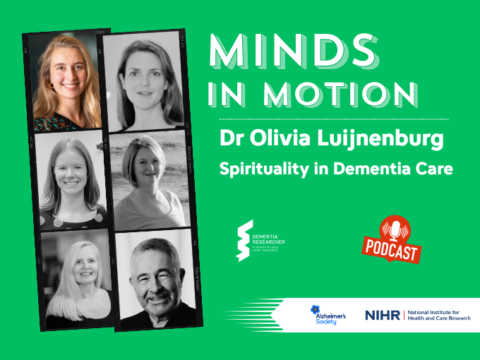How can I generate real social impact? This was the question that first drew me to academic research. I had followed a traditional career path – undergraduate in Sociology, Masters and then PhD in Gerontology – but I always wrestled with the idea of how I could make sure my research was benefiting people, bringing real change and contributing positively to the world.
In conversation with my colleague Pepsi Reilly, also a former academic, I soon realized that this desire for social impact was a shared motivator between us. A motivator that had ultimately drawn us both to work in Dementia Innovation at Alzheimer’s Society.
The Alzheimer’s Society Innovation Team runs programmes and support packages to help people develop products for people living with dementia. Our latest support package, Launchpad, is designed for academics just like our former selves. Applicants can stay in academia whilst gaining the skills and opportunities to turn product ideas into convincing commercial propositions (AKA Impact). This creates opportunities for real world experiments, new funding proposals and makes sure that the products helping people living with dementia are truly evidence-based from the outset and throughout.
Pepsi and I put our heads together to think through some of the adjustments we made when moving into innovation. We hope to give anyone thinking of applying for launchpad, or our other programmes, a better view of what this transition could look like:
Speed Speed Speed
In academia, you often work on long projects, with robust and lengthy evidence collection and evidence reviews. Innovation is about agility, collaboration, and speed. It is a fast-paced environment, and ideas can morph into prototypes within weeks. Launchpad itself is only a four-month support package! But researchers are equipped with some of the best skills in project management and adaptability. Leading and executing complex research projects with multiple stakeholders and sometime surprising findings. Academics are masters at prioritising actions whilst maintaining their focus on the big questions. This means if you want to work fast – you’ve have already got the skills to do so.
Embracing Failure
Innovation isn’t just about doing things quickly. It is also about continually testing ideas, embracing feedback and changing actions on the back of this learning. It is quite a scientific way to work. But it doesn’t allow space for you to be emotionally attached to ideas. I personally found this liberating. Despite truly believing in evidence-based decision making, during my time in academia, I found that my whole identity became my thesis and my research outputs. By extension a null result felt like a personal failure, despite how much I told myself that it was an entirely valid outcome from a good research study. In innovation, failure is a badge of honor. It is a marker that you have your ear to the ground and are brave enough to really change your idea based on the data and evidence you are using. “Failing fast” is the gold standard. How can you learn so quickly that you waste no time at all, no money or the effort going down the ‘wrong path’? If you have ever had an article receive harsh criticism from particularly meticulous peer-reviewer, then you will know (as I do) that academics are an incredibly resilient. This means we can thrive in this fail-fast environment when others simply can’t.
Minimal viable versions
With the onus on speed and iterative development, the priority in early-stage innovation is to create a minimal version of something. I.e. produce just what is needed to be able to test a first concept and nothing more. Being able to work iteratively and at pace is a gearshift. For example, typical research proposals are lengthy and highly detailed, with application rounds taking months to scrutinize the integrity of the proposal. At first, I felt a little vulnerable putting things out into the world that didn’t seem ‘finished’ or ‘polished’ because they hadn’t been through this process of multiple checks and balances. Academics can also be some of the world’s most natural perfectionists. But the real skill here is the ability to distill all the many interactions between a complex problem space and an idea down to a series of ‘unknowns’ and ‘knowns’. These can then be turned into hypotheses, ranked, and systematically tested. With this framing, minimal viable products are not ‘unfinished’ or ‘lacking rigor’, but these product versions are just optimised to most efficiently test each hypothesis.
There are research methods here
Once an idea has been crystalised right down to a series of hypotheses and a minimal viable product – in come the bricks and mortar research skills. How can you identify and recruit a group to test with, how can you glean the information you want, what are the pros and cons of interviews versus surveys etc. In my opinion academic methods are sometimes undersold due to a bit of a branding challenge. Hereby, what are often similar skills, approaches and methods are confused as being different. Simply because they’ve got different names. ‘Users’ please say hello to ‘participants’, ‘affinity mapping’ meet ‘thematic analysis’, ‘roadmap’ introduce yourself to ‘research plan’.
In short, the single biggest reason that academics make good innovators – is because yes you guessed it … they already are.
Conclusion
Within dementia innovation, given the scale of the challenges we face, the opportunity to design useful solutions is huge. To do this, you have the chance to collaborate with experts across a wide range of sectors, bringing your vision to life; engineers, designers, and marketers.
Moving from academia into dementia innovation and product development was one of the most rewarding decisions of my career. It challenged me to grow, adapt, and embrace uncertainty, all while allowing me to leverage my academic strengths. There are big challenges, but seeing an idea come to life, striving to make real-world impact on people’s lives is what will continue to drive me.
The Innovation Team at Alzheimer’s Society runs several support packages to help entrepreneurs create and develop products for people living with dementia. Launchpad, our newest offer, is a free four-month, part-time, support package particularly targeted at academics. Through a series of 1:1 commercial coaching sessions, innovation masterclasses, idea testing workshops and networking events you will be able to turn the earliest ideas into a convincing commercial product to win pilot funding and grow a research venture.
Find out more in our Applicant Handbook, available on our website, or come and chat to us in our Wednesday afternoon office hours.

Dr Ella Moonan-Howard
Authors
Ella Moonan-Howard is a Senior Innovator at the Alzheimer’s Society. Ella previous worked at Zinc, supporting early stage start-ups and their founders to build research skills and to test their products as they built them. Obsessed with seeing the direct impact these start-ups could make, she moved to Alzheimer’s Society to ensure the next generation of dementia products go on to achieve scale and change the lives of those living with dementia.

Pepsi Reilly
Pepsi Reilly has worked at the Alzheimer’s Society since 2022 holding a number of positions within the Innovation Team, and having previously worked a number of charities and as a Research Assistant at University College London. Her work at UCL was focussed on dementia and care, and included work on the Continuing Compassion in Care (CCiC) Project: Exploring how informal carers of people living with dementia experience and maintain continuing compassion in care.

 Print This Post
Print This Post





